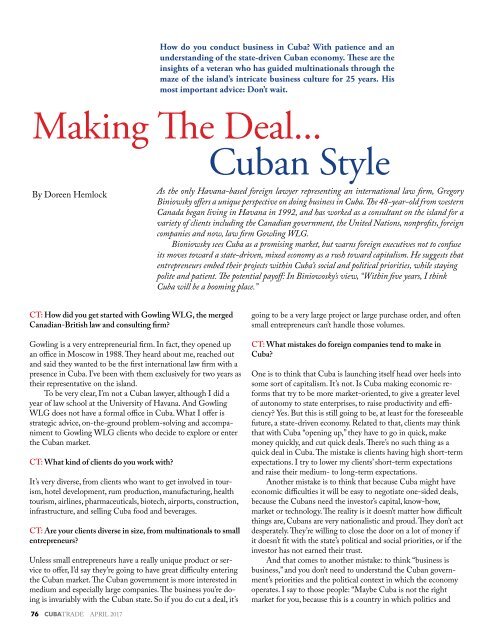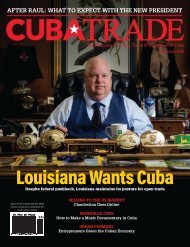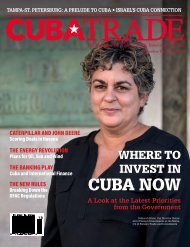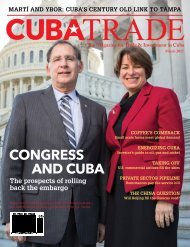CubaTrade-April2017-FLIPBOOK
Create successful ePaper yourself
Turn your PDF publications into a flip-book with our unique Google optimized e-Paper software.
How do you conduct business in Cuba? With patience and an<br />
understanding of the state-driven Cuban economy. These are the<br />
insights of a veteran who has guided multinationals through the<br />
maze of the island’s intricate business culture for 25 years. His<br />
most important advice: Don’t wait.<br />
Making The Deal...<br />
Cuban Style<br />
By Doreen Hemlock<br />
As the only Havana-based foreign lawyer representing an international law firm, Gregory<br />
Biniowsky offers a unique perspective on doing business in Cuba. The 48-year-old from western<br />
Canada began living in Havana in 1992, and has worked as a consultant on the island for a<br />
variety of clients including the Canadian government, the United Nations, nonprofits, foreign<br />
companies and now, law firm Gowling WLG.<br />
Bioniowsky sees Cuba as a promising market, but warns foreign executives not to confuse<br />
its moves toward a state-driven, mixed economy as a rush toward capitalism. He suggests that<br />
entrepreneurs embed their projects within Cuba’s social and political priorities, while staying<br />
polite and patient. The potential payoff: In Biniowosky’s view, “Within five years, I think<br />
Cuba will be a booming place.”<br />
Within five years, I<br />
think Cuba will be<br />
a booming place<br />
Gregory Biniowsky,<br />
Gowling WLG<br />
CT: How did you get started with Gowling WLG, the merged<br />
Canadian-British law and consulting firm?<br />
Gowling is a very entrepreneurial firm. In fact, they opened up<br />
an office in Moscow in 1988. They heard about me, reached out<br />
and said they wanted to be the first international law firm with a<br />
presence in Cuba. I’ve been with them exclusively for two years as<br />
their representative on the island.<br />
To be very clear, I’m not a Cuban lawyer, although I did a<br />
year of law school at the University of Havana. And Gowling<br />
WLG does not have a formal office in Cuba. What I offer is<br />
strategic advice, on-the-ground problem-solving and accompaniment<br />
to Gowling WLG clients who decide to explore or enter<br />
the Cuban market.<br />
CT: What kind of clients do you work with?<br />
It’s very diverse, from clients who want to get involved in tourism,<br />
hotel development, rum production, manufacturing, health<br />
tourism, airlines, pharmaceuticals, biotech, airports, construction,<br />
infrastructure, and selling Cuba food and beverages.<br />
CT: Are your clients diverse in size, from multinationals to small<br />
entrepreneurs?<br />
Unless small entrepreneurs have a really unique product or service<br />
to offer, I’d say they’re going to have great difficulty entering<br />
the Cuban market. The Cuban government is more interested in<br />
medium and especially large companies. The business you’re doing<br />
is invariably with the Cuban state. So if you do cut a deal, it’s<br />
going to be a very large project or large purchase order, and often<br />
small entrepreneurs can’t handle those volumes.<br />
CT: What mistakes do foreign companies tend to make in<br />
Cuba?<br />
One is to think that Cuba is launching itself head over heels into<br />
some sort of capitalism. It’s not. Is Cuba making economic reforms<br />
that try to be more market-oriented, to give a greater level<br />
of autonomy to state enterprises, to raise productivity and efficiency?<br />
Yes. But this is still going to be, at least for the foreseeable<br />
future, a state-driven economy. Related to that, clients may think<br />
that with Cuba “opening up,” they have to go in quick, make<br />
money quickly, and cut quick deals. There’s no such thing as a<br />
quick deal in Cuba. The mistake is clients having high short-term<br />
expectations. I try to lower my clients’ short-term expectations<br />
and raise their medium- to long-term expectations.<br />
Another mistake is to think that because Cuba might have<br />
economic difficulties it will be easy to negotiate one-sided deals,<br />
because the Cubans need the investor’s capital, know-how,<br />
market or technology. The reality is it doesn’t matter how difficult<br />
things are, Cubans are very nationalistic and proud. They don’t act<br />
desperately. They’re willing to close the door on a lot of money if<br />
it doesn’t fit with the state’s political and social priorities, or if the<br />
investor has not earned their trust.<br />
And that comes to another mistake: to think “business is<br />
business,” and you don’t need to understand the Cuban government’s<br />
priorities and the political context in which the economy<br />
operates. I say to those people: “Maybe Cuba is not the right<br />
market for you, because this is a country in which politics and<br />
social priorities are inextricably linked with business.” Sometimes,<br />
my challenge is assisting the client to embed their business<br />
proposal within what I see as the Cuban government’s priorities.<br />
If you’re sensitive to those priorities, you have a greater chance of<br />
actually being successful.<br />
CT: How do you align client projects with Cuban priorities?<br />
It’s understanding that 1) the Cuban government needs hard<br />
currency coming into the country; you have to show that. And<br />
2) the Cuban government is very cautious about giving up control.<br />
They feel threatened, I think, for justifiable reasons. So, for<br />
most ventures, they want 51 percent control, so they can make<br />
sure the business is managed in a way that meets whatever their<br />
priorities are—whether it’s buying inputs for that business from<br />
one country over another or when payments are made.<br />
For instance, take hotels and where Cuba wants them. Right<br />
now, they’re really saying to foreigners with equity, “No, it’s not<br />
Havana. It’s not Varadero. We’re going to start building hotels<br />
in Las Tunas or these outlying provinces that are not benefitting<br />
as much from the influx of tourism.” So, their social priority is<br />
to start spreading around the wealth, and where a hotel is being<br />
built is more important than the size.<br />
Where politics also trumps business is in decision-making.<br />
Foreign executives sometimes expect that the government official<br />
sitting across the table in Cuba is the actual person who makes<br />
the decision, and they’re not. These big decisions are made higher<br />
up, so it makes the negotiating process more complex. Why? Because<br />
the Cuban government wants to vet, control, approve and<br />
analyze all ventures signed.<br />
CT: What time horizon do you tell clients to expect on Cuban<br />
projects?<br />
For a simple trade agreement, to sell the Cubans something, it’s<br />
shorter—maybe several months, not days or weeks.<br />
But if you’re looking at a project where there is an investment<br />
or a long-term contract for some kind of service, you’re<br />
looking at a year at least. It’s slow partly because the Cubans are<br />
cautious, and partly because the bureaucracy is slow, a bit overwhelmed,<br />
and doesn’t have a lot of the resources it would like.<br />
My advice is, be patient and take the time to understand the<br />
Cuban government’s priorities. Read some of the key documents<br />
that encapsulate those priorities, like the Lineamientos and the<br />
Portfolio of Opportunities for Foreign Investment, to get an idea<br />
of where their heads are at.<br />
CT: What other recommendations do you have for negotiating<br />
business in Cuba?<br />
I suggest five Ps. First, be polite. Don’t come in here with the arrogance<br />
and hubris of a cowboy, saying “I know what the Cubans<br />
need, and I’m going to tell them what they need.” I tell my clients,<br />
“Your first meeting with the Cubans, shut up and listen. Don’t go<br />
right into your sales pitch. Listen. Ask questions. Then, when you<br />
finally make your pitch, you say something like, “On the basis of<br />
what I understand to be Cuba’s priorities—social, political and<br />
economic—I think this business idea might find alignment with<br />
your government’s long-term development strategy.”<br />
So, come in with humility. Understand that these guys have<br />
stood up to the United States for 50 years, and they don’t take<br />
76 CUBATRADE APRIL 2017
















